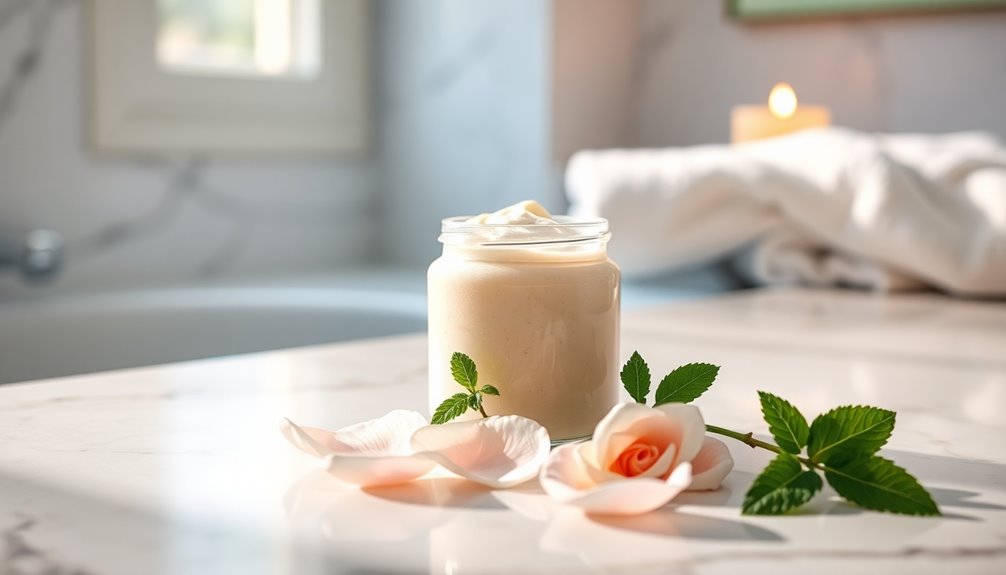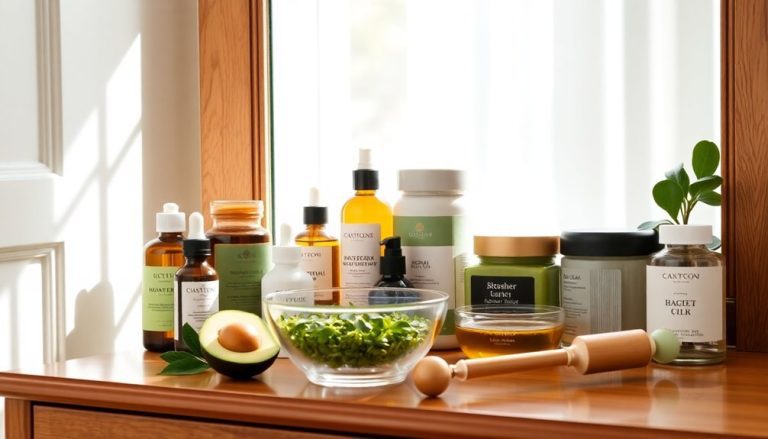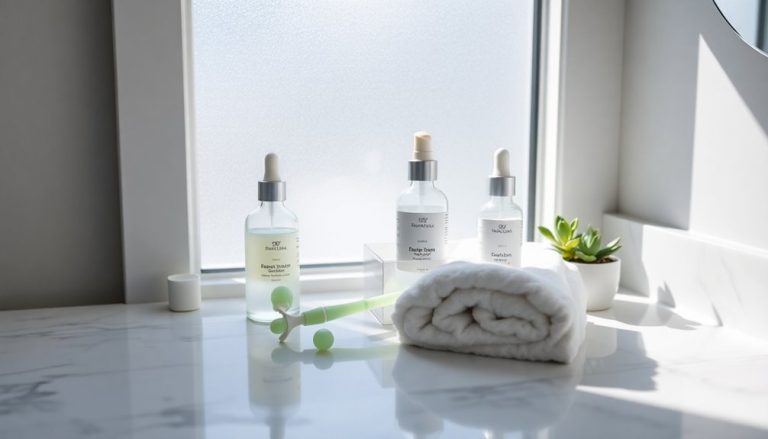Choosing gentle exfoliants for sensitive skin is essential to avoid irritation and discomfort. Your skin's thinner epidermis makes it more susceptible to harsh chemicals and physical scrubs, which can lead to redness and inflammation. Gentle exfoliation improves your skin's texture and boosts product absorption without compromising the protective barrier. Look for ingredients like lactic acid, fruit enzymes, and soothing agents such as aloe vera, which offer effective smoothing without irritation. Regularly assessing your skin's response helps maintain balance. There's plenty more to discover about the best practices for achieving healthy, radiant skin.
Key Takeaways
- Gentle exfoliants minimize irritation, making them suitable for sensitive skin prone to redness and discomfort.
- They help maintain the skin's moisture balance, crucial for a healthy and resilient skin barrier.
- Natural ingredients like fruit enzymes and lactic acid provide effective exfoliation without harsh side effects.
- Gentle exfoliation improves skin texture and enhances product absorption without compromising skin integrity.
- Regular use can reduce breakouts and promote a vibrant appearance without over-stimulating sensitive skin.
Understanding Sensitive Skin
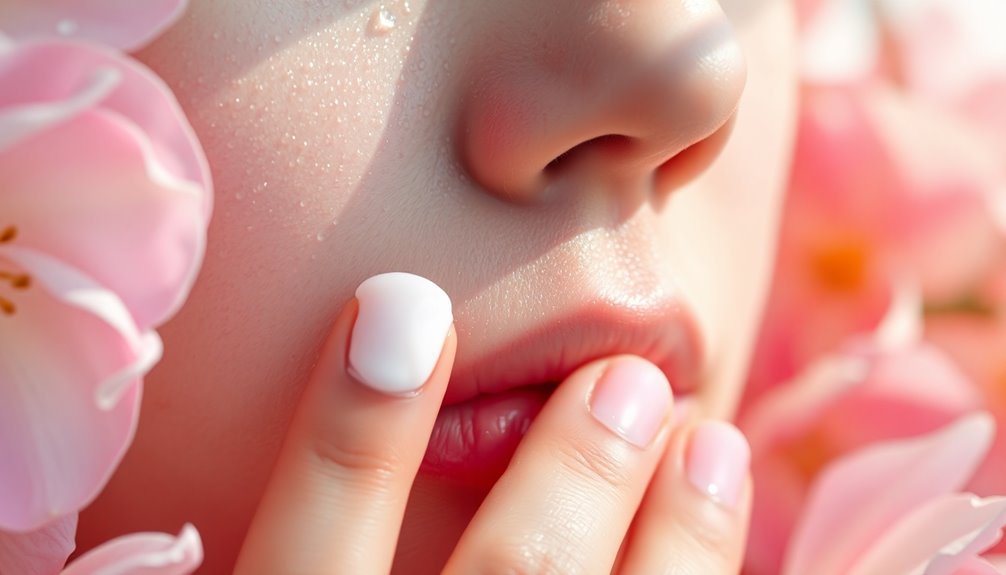
Understanding Sensitive Skin
Sensitive skin affects a significant portion of the population, often resulting in irritation, redness, or discomfort. If you have sensitive skin, you know it can react unpredictably to various products and environmental factors. This skin type typically has a thinner epidermis, making it more susceptible to external irritants, allergens, and even changes in temperature.
You might notice that certain ingredients in skincare products can trigger reactions, causing your skin to feel tight or inflamed. Common triggers include fragrances, alcohol, and harsh exfoliants. It's essential to recognize your skin's unique needs and avoid products that exacerbate sensitivity. Using face exfoliating pads with gentle formulations can also alleviate the concerns associated with sensitive skin.
Pay attention to how your skin responds after trying new products or treatments. You may find that certain textures or formulations work better for you. For example, cream-based products often provide a soothing effect compared to foaming cleansers. Additionally, using gentle exfoliating scrubs can help improve your skin's texture without causing irritation.
Understanding your skin's sensitivity helps you make informed choices about what you apply. By identifying your specific triggers and preferences, you can create a customized skincare routine that minimizes irritation while promoting overall skin health.
Benefits of Gentle Exfoliation
- Improved Skin Texture: Regular gentle exfoliation smoothens your skin's surface, enhancing its overall feel and appearance. Incorporating charcoal face scrubs into your routine can be a great way to achieve this.
- Enhanced Absorption: By sloughing off dead skin, your skincare products penetrate deeper and work more effectively.
- Brightened Complexion: Gentle exfoliation helps to reveal fresh skin underneath, giving you a radiant glow.
- Reduced Breakouts: It can prevent clogged pores, which helps minimize the occurrence of acne and blemishes.
- Increased Circulation: The process stimulates blood flow, promoting a healthy and vibrant complexion.
Incorporating gentle exfoliation into your routine can transform your skin while keeping irritation at bay. Additionally, pairing gentle exfoliation with Vitamin C Serums can further enhance your skin's brightness and overall health.
You'll notice that your skin not only looks better but also feels rejuvenated, giving you the confidence to show it off.
Key Ingredients to Consider
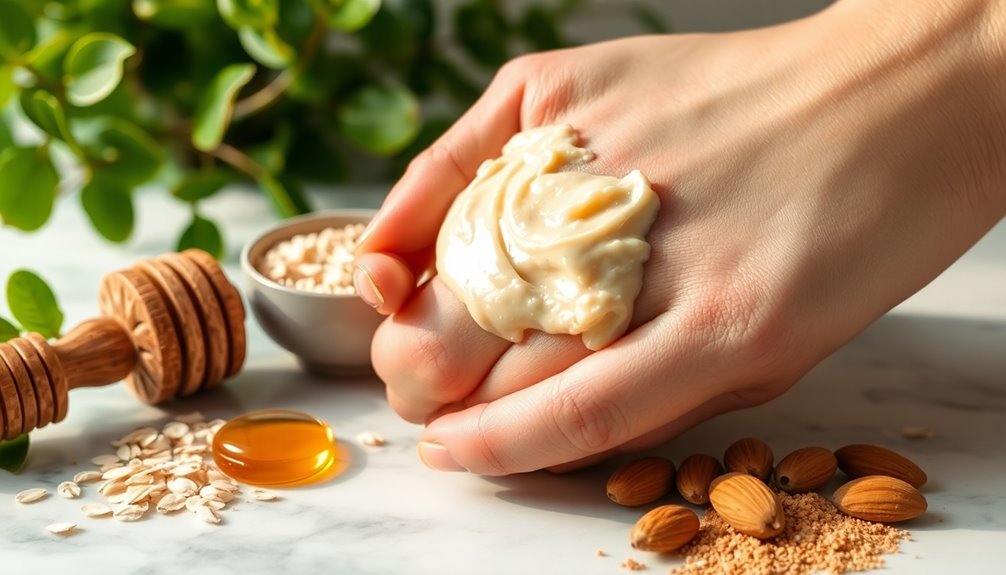
When it comes to choosing the right gentle exfoliants for your skin, knowing which key ingredients to look for can make all the difference.
Start by seeking out natural exfoliants like fruit enzymes, particularly papaya and pineapple. These enzymes gently dissolve dead skin cells without causing irritation, making them perfect for sensitive skin.
Another essential ingredient to consider is lactic acid. This alpha hydroxy acid (AHA) is derived from milk and is known for its hydrating properties. It exfoliates while also helping to maintain your skin's moisture balance, preventing dryness and discomfort.
You should also keep an eye out for soothing agents like aloe vera and chamomile. These ingredients can calm inflammation and redness, ensuring your skin feels comfortable after exfoliation. Aloe vera gel is particularly beneficial for skin hydration due to its natural moisturizing properties.
Additionally, look for products that contain antioxidants, such as green tea extract, which help protect your skin from environmental damage while promoting a healthy glow.
Finally, always check for fragrance-free options. Artificial fragrances can irritate sensitive skin, so sticking to gentle formulations will help you achieve the best results without compromising your skin's health.
Exfoliation Techniques for Sensitivity
Finding the right exfoliation techniques can significantly enhance your skincare routine, especially if you have a delicate complexion.
It's crucial to approach exfoliation gently, using methods that respect your skin's sensitivity. Here are some techniques to consider:
- Chemical Exfoliants: Opt for mild acids like lactic or mandelic acid, which are less irritating yet effective in removing dead skin cells.
- Physical Exfoliants: Choose soft, natural fibers or gentle scrubs with fine particles. Avoid harsh scrubs that can cause micro-tears.
- Exfoliating Cloths: Use a damp, soft washcloth to gently rub your face, providing a mild exfoliation without harsh ingredients.
- Frequency Control: Limit exfoliation to once or twice a week to prevent over-exfoliation, which can lead to irritation.
- Patch Testing: Always test new products on a small area of skin before using them all over your face to ensure there's no adverse reaction.
Recommended Products for Gentle Exfoliation
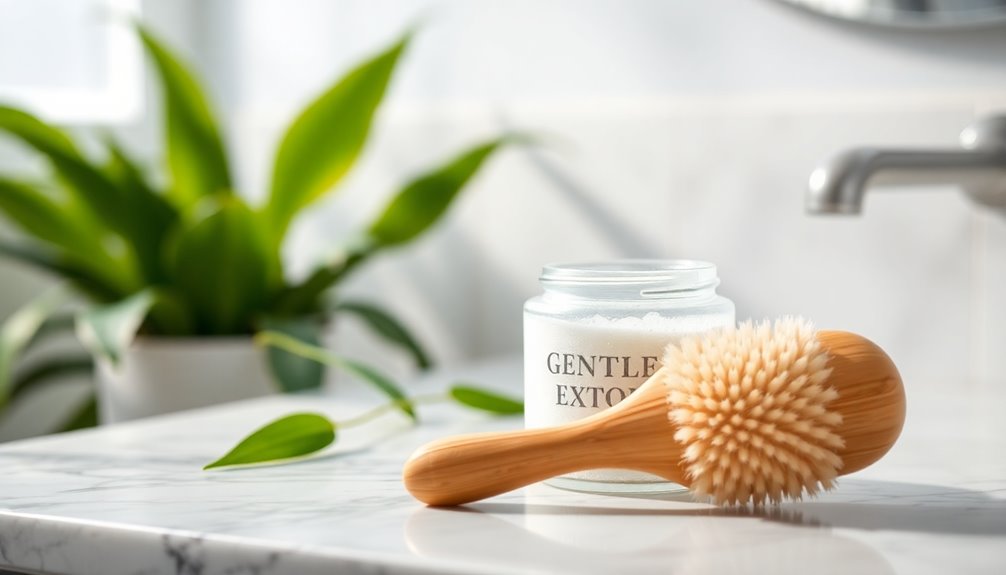
For those with sensitive skin, choosing the right products can make all the difference in achieving a smooth, radiant complexion without irritation. Look for gentle exfoliants that contain natural ingredients, such as lactic acid or fruit enzymes, which can effectively slough away dead skin without causing redness or discomfort.
One fantastic option is a gel-based exfoliating mask with papaya or pineapple enzymes. These masks break down dead skin cells gently and can be used weekly to maintain your skin's glow.
Alternatively, consider a mild scrub infused with oatmeal or rice powder, which offers gentle physical exfoliation without harshness.
Another great choice is a hydrating chemical exfoliant with low concentrations of glycolic acid. This will help exfoliate while keeping your skin moisturized. Brands like Paula's Choice and The Ordinary offer formulations specifically targeting sensitive skin.
Finally, don't overlook products like gentle exfoliating pads soaked in soothing ingredients like chamomile or green tea. These can provide a quick and effective way to refresh your skin without any irritation.
Always remember to patch-test new products to ensure they suit your skin's unique needs.
Frequency of Exfoliation
Determining the right frequency for exfoliation is crucial for maintaining the health of sensitive skin. Over-exfoliating can lead to irritation, redness, and a compromised skin barrier, so it's essential to find a balance that works for you.
Generally, gentle exfoliation can be done 1-3 times a week, depending on your skin's specific needs and tolerance.
Here are some tips to help you decide on the right exfoliation frequency:
- Start Slow: If you're new to exfoliation, begin with once a week.
- Monitor Reactions: Pay attention to how your skin responds after each session.
- Consider Seasonality: Your skin may need more frequent exfoliation during hot, humid months.
- Adjust for Conditions: Skin conditions like eczema or rosacea may require less exfoliation.
- Stay Hydrated: Always follow exfoliation with a good moisturizer to keep your skin barrier healthy.
Signs of Over-Exfoliation
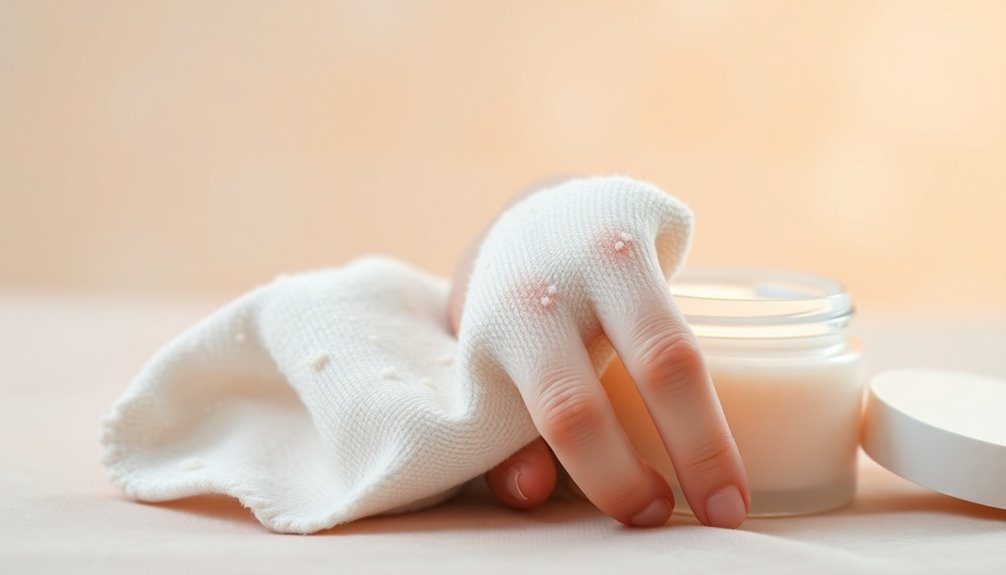
Over-exfoliating can lead to several noticeable signs that indicate your skin's barrier is compromised. One of the first signs you might notice is increased sensitivity. If your skin feels irritated or reacts negatively to products that usually work well, it's a strong indicator that you've gone too far.
Another common sign is redness. You may find your skin looking flushed or even inflamed, which suggests that it's struggling to recover from excessive exfoliation.
Dryness or flakiness can also occur, as over-exfoliation strips away your skin's natural oils, leaving it parched and rough.
Breakouts may surprise you as well. While exfoliating helps clear pores, overdoing it can lead to inflammation and clogged pores, resulting in unwanted blemishes.
You might also notice a stinging or burning sensation after using products on your skin, a clear signal that your barrier is compromised.
If you experience any of these symptoms, it's crucial to pause your exfoliation routine and let your skin heal.
Choosing gentle exfoliants and reducing frequency can help restore balance to your skin, allowing it to regain its natural glow.
Frequently Asked Questions
Can I Use Gentle Exfoliants on Acne-Prone Skin?
Yes, you can use gentle exfoliants on acne-prone skin. They help remove dead skin cells without causing irritation, promoting clearer skin. Just ensure you choose products specifically formulated for acne concerns to avoid excess dryness.
How Do I Know if I Have Sensitive Skin?
You'll know you have sensitive skin if you often experience redness, itching, burning, or dryness after using products. Pay attention to reactions following sun exposure or harsh weather, too; these can indicate sensitivity as well.
Are Natural Exfoliants Better Than Chemical Ones?
Studies show that 70% of people prefer natural exfoliants. You'll find they're often gentler on your skin, reducing irritation while still effectively removing dead cells, unlike some harsher chemical options that can cause redness.
Can I Exfoliate if I Have Rosacea?
If you have rosacea, you can exfoliate, but it's crucial to choose gentle methods. Opt for mild exfoliants, and always test on a small area first to avoid irritation and flare-ups.
What Should I Do if I Experience Irritation?
If you experience irritation, stop using the product immediately. Rinse your skin with cool water, apply a soothing moisturizer, and consider consulting a dermatologist for personalized advice to prevent further irritation. Your skin deserves care!
Conclusion
In summary, choosing gentle exfoliants for your sensitive skin can make all the difference. By opting for milder options, you'll keep your skin happy and healthy without the risk of irritation. Remember, it's better to be safe than sorry—listen to your skin and adjust your routine as needed. With the right approach, you can enjoy the benefits of exfoliation without the drawbacks. So go ahead, treat your skin with the care it deserves!

